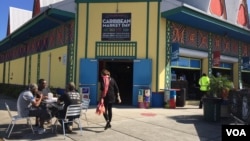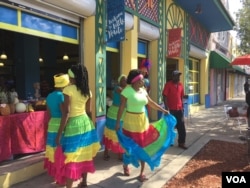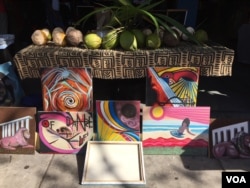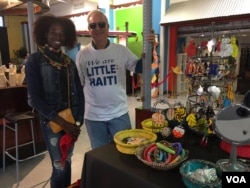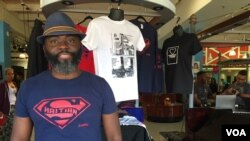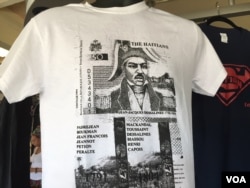On a sunny Saturday afternoon in Miami's Little Haiti neighborhood, tropical music fills the air as two friends sip from a freshly cut coconut outside the Caribbean Marketplace.
Nearby, two men are savoring grilled meat and Jamaican patties with rice and peas. Farther down the sidewalk, on the weekly market day, a group of girls and women in vibrant, traditional Creole dresses, practices dance moves.
Despite the festive atmosphere, Haitians worry about the impact of gentrification on the area. Some are hoping to see the market operate seven days a week, as an economic lifeline and way to bond culturally. Little Haiti, considered the “cultural heart of the Haitian diaspora” in the United States, was established by Haitian refugees - many of whom arrived on boats in the 1980s.
“Because of gentrification - it’s the only thing that we have so we’re trying to keep this going, said Hoppy Duroseau, a Little Haiti resident involved with marketing and promotions for the Caribbean Marketplace on social media. Born in St. Louis du Nord, Haiti, Duroseau immigrated to the United States at age four.
“We want to keep it busy all the time because if not - then we’ll lose this place and we’ll no longer have Little Haiti. Little Haiti is the only one in the world. So we need to keep this.”
Gentrification effort
The vibrant neighborhood full of art galleries, Haitian-owned businesses and restaurants has undergone a gentrification effort that sent rents climbing by as much as 50 percent in 2016. Many Haitian-owned businesses were forced to close.
Myrlande, a vendor selling Haitian food at the Caribbean Marketplace says she is among the Haitians directly affected by gentrification.
“It’s a dead zone; nothing is going on. Haitians have pretty much left the neighborhood,” she says. “I - myself had a business in the neighborhood and the rent went up so high that I was forced to leave. They didn’t evict me per se, but that’s the end result. That is why we’ve lost almost all the Haitian-owned businesses in the community. That’s why we are trying to have them open the Caribbean Marketplace every day so we can have a place to call home. But I don’t know.”
Gentrification is defined as “the process of renovating and improving a house or district so that it conforms to middle-class taste.” According to some real estate developers, the Little Haiti location is desirable because of its higher elevation, making it less vulnerable to flooding and rising sea levels.
David C. Brown, author of The History of Little Haiti: Featuring Its Pioneers, says the unique neighborhood is a testament to the resilience of the Haitians who moved there. “It was successful because of the values the Haitian has - like any other immigrant communities and just like any other nationality - and those values that I see so clearly that shone through in the Haitian spirit are the values of family, education and work ethic. Those are the three values that have helped to raise the bar of this immigrant community.”
Marketplace vendors
In the colorfully painted market, a stylish, bearded man wearing a blue hat with a matching T-shirt catches our eye. He stands in front of a stall with various graphic T-shirts and hoodies on display. The image on his shirt resembles the Superman logo - but the words in bright red say Haitian.
Roe Michel immigrated to the United States from Haiti at age two with his parents. He designs the T-shirts he sells and the one he’s wearing is very popular with customers, he tells VOA.
“This T-shirt is called the Super Haitian,” he says, flashing a bright smile. “You know Haitians have this tenacity to get through anything. Knowing our history, I always feel empowered.”
Michel’s brand is called Vintage 1804, a reference to the year Haitian slaves declared their independence from France and became the first free black nation in the Western Hemisphere.
Another bestseller, according to Michel, is his Haitian heroes shirt, which features the heroes of the war for independence - Jean-Jacques Dessalines, Toussaint Louverture, Alexandre Petion - to name a few. Michel tells us his customers are a mix of Haitians and Americans.
Across the room stands Jamaican-born Aura Bond, who now lives in Miami's Miramar suburb. The co-owner of the shop Bjou Bjou is wearing a stylish denim jacket and a beaded Masai statement necklace around her neck. She is surrounded by customers who are trying on earrings and African printed fabric head wraps, or looking at crocheted bathing suits, asking numerous questions.
“I fell in love with the whole Little Haiti entirety. I love it here,” she tells VOA, noting that the items she sells helps women in Haiti as well as Kenya and Ghana to sustain themselves economically.
“It is a virtual marketplace that provides underrepresented producers a global platform. So when I come here, I’m basically selling what’s left over from a week’s sales from online.”
Bond says she became involved with the Caribbean Marketplace through word of mouth and because of the low vendor fees which made selling her merchandise there even more appealing. There are fabric earrings, recycled tin earrings, vegan banana fiber earrings “Those are best sellers. They’re vegan of course,” she says.
Her crochet bathing suits are made in Haiti by teenage girls in an after school program.
By mid-afternoon, the Caribbean Marketplace buzzes with adults, children and teenagers from various cultural backgrounds partaking in the multiple activities occurring simultaneously. A DJ hosts a Little Haiti Trivia contest for the children - some of whom are getting help from their parents. Meanwhile, a group of young women demonstrates a traditional Creole dance. A few steps away, a clown on stilts tries to entice people to dance with her. Back in a corner, an artist applies paint to a canvas. And the wooden stage off to one side is busy with musicians and technicians, setting up for a show by the popular Haitian Compas music band Gabel.
" I just relocated to Miami and so I’m just looking for cultural things to do,” says first-time visitor Melodie Davis-Bundrage. “I’m always looking to support black businesses. Honestly with the recent political issues that have gone on - with the comments that were said negatively about Haiti and the whole immigration issues that have been happening, I really wanted to support Little Haiti in particular. "
Vendor Myrlande voiced optimism about the future as the evening came and crowds thinned.
“Business today was not bad at all, but I just wish we could have the same amount of people every Saturday,” she said. “Although I didn’t make a lot of money today, I’m satisfied, I’m happy.”
If Hoppy Duroseau has his way, the Caribbean Marketplace will thrive and Little Haiti will be great again.
Serge Michel from VOA's Creole service contributed to this story.




